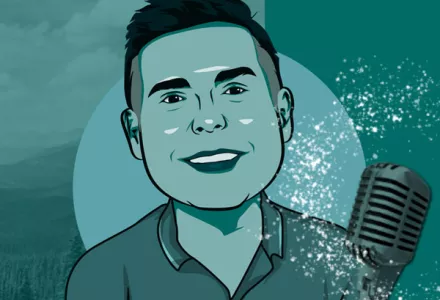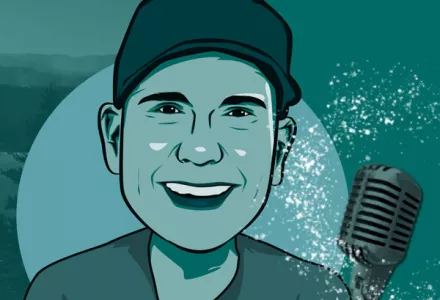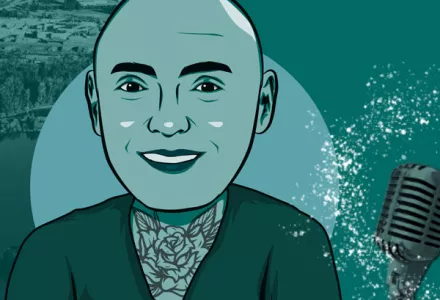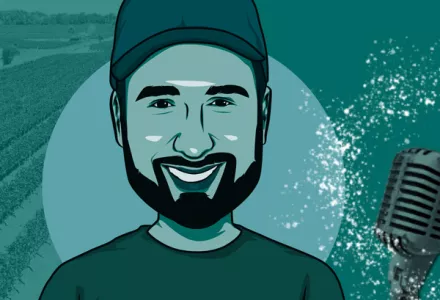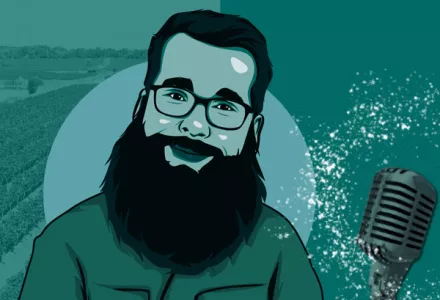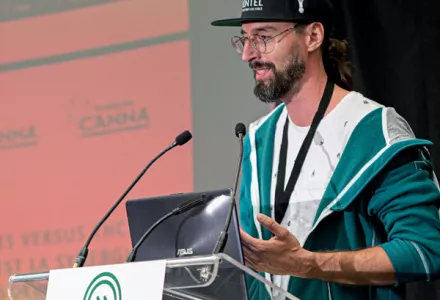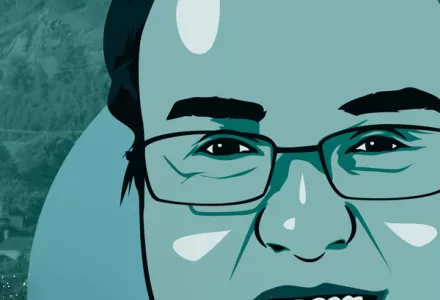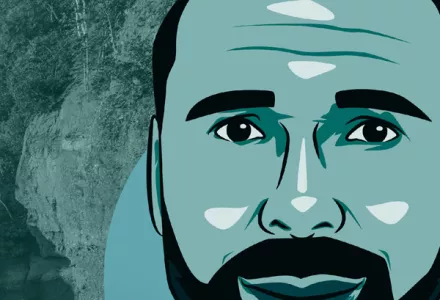At CANNA we’re excited to share passionate grower stories from across Canada that resonate with our community and inspire us to “Grow big or grow home”.
GROWER SPOTLIGHT
My name is Kim Qvist, and I'm the responsible person in charge at Life Cycle Botanics.
Kim: My day-to-day involves overseeing all aspects of operations, ensuring compliance with regulations, and working alongside a dedicated team. Lots of audits and inspections, for CRA, Health Canada. They want to know how many plants you have on site and how many you've destroyed; What you're doing and where it's going; HLVd Testing is a big thing,… I spend a majority of my time doing paperwork.
How did you first step into the world of growing?
Kim: I first stepped into the world in my late teens through Mark. His passion for cannabis sparked my curiosity.
What's your personal garden like at home?
Kim: We have a pretty big garden at home. It starts as a collaborative effort with the whole family, and then it definitely becomes a trend to just leave it up to Mark to ensure it's cared for and it survives [Ha! Ha!]
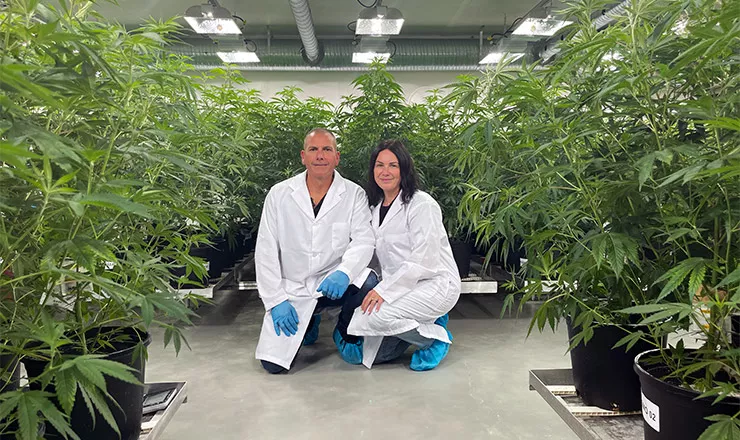
PROFESSIONAL JOURNEY
Reflecting on your evolution over the past few years, how has your passion and approach to cultivation and the role changed?
Kim: I enjoy the industry very much; it's challenging. I love being in the grow room. I love the changes of just walking in day to day and how just even something so simple as changing the lights can affect the plant so drastically. Just the growth the next day or how they thrive in different environments is pretty neat to see. My passion for it has definitely grown over time. I enjoy sort of trying to get around the hurdles and things, and it's really nice to see the accomplishments when we get there.
Can you share any initial fears you had about entering the industry?
Kim: Stigma, for sure, is definitely the biggest thing. Especially being a mom, it concerns me what people might think about my profession.
What are some of the bigger challenges have you faced in the Canadian Cannabis Industry?
Kim: Starting out, the large hurdle was obtaining security clearances; it felt like a tough battle that caused significant delays. The regulatory landscape was daunting, with banking and financial hurdles being particularly challenging. We've been kicked out of numerous banks, and struggled with getting mortgages, a testament to the barriers still present in the industry despite cannabis being legal.
Can you share a particularly rewarding moment or success story that stands out in your career with Life Cycle Botanics?
Kim: A pivotal moment was overcoming the devastating fire that razed our nursery to the ground. With no insurance payout, we faced an uphill battle to rebuild from scratch. The fire happened in November, yet by mid-December, we were building again, and by the following October, we were licensed. This journey from ashes to a licensed facility in less than a year was a testament to our team's resilience and determination.
Are there other women in the industry that you admire or consider as role models?
Kim: Definitely, there are many women doing amazing things in the industry. May Khatib, a specialist in cannabis regulatory compliance with Merit Compliance Inc., stands out. She supported us immensely in the early days when the landscape was predominantly large LPs, and her guidance was invaluable. It’s women like her who pave the way for others in the cannabis community.

GROWING &
MOTHERHOOD
Mother plants require special care to thrive. Can you share an approach to keeping mother plants healthy and happy?
Kim: We need to be extra vigilant to keep our mother stock clean of pests and pathogens among numerous other potential growing pains. We have an attentive IPM team that's committed to daily inspections of our plants and facility in general for any potential issues. We have stringent environmental controls to mitigate the risk of powdery mildew and we're continually conducting regular HLVd testing to ensure cleanliness of our genetics at all times.
As a mother in the cannabis industry, have you faced any stigma, and how have you navigated these challenges?
Kim: Yes, stigma has been a significant concern, especially around being a mom. There have been moments, like at doctor's visits, where upon learning of my profession, the immediate assumption jumps to whether I expose my kids to cannabis. But it goes beyond healthcare settings. Interacting with other parents and engaging in school activities brings its own set of challenges. I sit on the school's parent advisory council, and when the topic of my profession comes up, it's met with mixed reactions. Some are curious, while others are quick to judge, worrying about the influence or perceived danger I might bring. These instances underscore the pervasive nature of stigma and highlight a critical need for education and changing perceptions around cannabis.
Do you share your love for plants with your children, and what do you hope they learn from it?
Yes, definitely. Mark and I have always believed in being open about our work with our children. They know about the nursery and what we do, even though they're still too young to be deeply involved. We're integrating them into our world in age-appropriate ways, like helping with our vegetable garden in the backyard and assisting with simpler tasks like labeling cups for retail clones. It's about more than just exposing them to our work; it's about instilling values. I hope they're absorbing the importance of persistence, hard work, patience, and a profound respect for nature—which is a significant aspect of cannabis cultivation.
As for the stigma associated with cannabis, it's a reality they face, especially as teenagers. By being open and discussing our work and the industry at home, I believe we're equipping them to handle and address stigma from an informed perspective. They've seen firsthand the hard work and dedication it takes to run a business in this industry, which I think instills a sense of pride and a nuanced understanding of cannabis beyond societal prejudices. It's crucial for them, and indeed for all of us, to appreciate the benefits and respect the nature of the work we do, navigating the challenges and opportunities with grace and knowledge.
What advice would you give to other women, especially moms, who are interested in entering the cannabis cultivation industry?
Kim: Follow their passions, stay informed, don't be afraid to ask questions. The industry is full of amazing supportive people willing to share their knowledge and experiences.
There's so many jobs in cannabis. There's so many different things you can do. There's a lot of hands-on, but there's a lot of people behind the scenes that aren't hands-on with the plants. It takes a village to make it all work. There's a lot of logistics to all of it.
With the myriad of challenges and successes, what’s next for Life Cycle Botanics? Can you share any upcoming projects or goals?
Kim: Looking ahead, we’re excited about our collaborative research project with Kwantlen Polytechnic University’s Applied Genomics Centre that will use a DNA fingerprinting protocol to accurately identify our plant varieties with a very high level of confidence to ensure ongoing product consistency and development. This initiative underscores our commitment to innovation and excellence in the cannabis space. Moreover, maintaining the health of our mother plants and ensuring the highest quality of our genetics remain our top priorities as we navigate the future.









